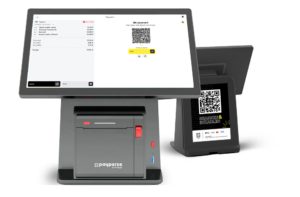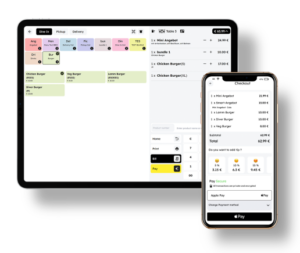Running a restaurant involves managing multiple aspects of the business, from menu planning to staff coordination and customer service. In this digital age, having a reliable and efficient Point of Sale (POS) system is crucial for streamlining operations, enhancing customer service, and improving overall business efficiency. Choosing the right POS system for your restaurant can be a game-changer, providing you with the tools and features necessary to meet your specific needs and deliver an exceptional dining experience.
In this comprehensive guide, we will explore the various factors to consider when selecting a POS system for your restaurant. We will discuss the importance of assessing your restaurant's needs, the key features and functionality to look for, scalability and future growth considerations, budget and cost considerations, return on investment, system reliability and support, integration and compatibility, staff training and adaptability, and data security. By the end of this article, you will have a clear understanding of how to choose the best POS system that aligns with your restaurant's requirements and goals.


What is a Restaurant POS System?
A Restaurant POS system refers to the software and hardware combination that enables restaurants to process transactions, manage orders, track inventory, and generate reports. It typically includes a touchscreen interface, receipt printer, cash drawer, and other peripherals required for seamless operation. A POS system serves as the central hub for managing various aspects of a restaurant's operations, providing a user-friendly interface for both staff and management.
Importance of Choosing the Right Restaurant POS System
Choosing the right POS system is of paramount importance for several reasons. Firstly, a well-designed POS system can streamline your restaurant's operations, allowing for faster order processing, efficient inventory management, and accurate reporting. This results in reduced wait times for customers improved table turnover, and increased overall efficiency. Secondly, a good POS system enhances customer service by enabling features such as table management, order customization, and integration with loyalty programs. Customers appreciate the convenience and personalization offered by a POS system that can cater to their specific needs and preferences. Finally, an effective POS system contributes to the overall business efficiency of your restaurant. It automates processes, eliminates manual errors, and provides real-time insights into sales and inventory. With these benefits, you can make data-driven decisions, optimize your menu offerings, and identify areas for improvement, ultimately leading to increased profitability and customer satisfaction. Read more: Top 8 Benefits of Using Restaurant POS SystemKey Factors to Consider When Choosing a POS System for Your Restaurant
Selecting the best POS system for your restaurant requires careful evaluation of various factors. By considering these key aspects, you can ensure that the chosen system aligns with your specific needs and provides the necessary features for optimal operations and customer experience.Assessing Your Restaurant's Needs
Type and Size of Restaurant Before diving into the details of POS systems, it is essential to consider the type and size of your restaurant. Different types of restaurants, such as quick-service, full-service, and fine dining establishments, have unique requirements that should be taken into account when choosing a POS system. For quick-service restaurants, speed and efficiency are critical. A POS system should enable fast order entry, intuitive menu customization, and seamless integration with kitchen display systems. On the other hand, full-service restaurants require table management capabilities, including table assignment, splitting checks, and reservation management. Fine dining establishments may have additional requirements such as wine list management and tableside ordering. Key Features and Functionality: Identifying the essential features required for smooth restaurant operations is vital when choosing a POS system. Some of the key features to look for include:- Order Management: The POS system should have intuitive order entry and modification options, including the ability to customize orders, apply discounts, and accommodate special requests.
- Inventory Tracking: Effective inventory management is crucial for controlling costs and ensuring stock availability. Look for a POS system that offers inventory tracking, automated alerts for low stock levels, and integration with suppliers for seamless reordering.
- Table Management: If your restaurant has table service, a POS system with table management capabilities is essential. It should allow you to manage reservations, assign tables, and track seating availability in real-time.
- Reporting and Analytics: A robust reporting system is crucial for gaining insights into your restaurant's performance. Look for a POS system that provides detailed reports on sales, inventory, employee performance, and customer behavior, helping you make data-driven decisions.
- Integration with Payment Processors: Seamless integration with popular payment processors ensures secure and efficient transaction processing. Consider a POS system that supports contactless payment options and emerging payment technologies to offer convenience to your customers.

Scalability and Future Growth:
When selecting a POS system for your restaurant, it is important to consider scalability and future growth. As your restaurant expands or changes, your POS system should be able to accommodate these developments. Consider the system's ability to handle increased transaction volume as your restaurant grows. Ensure that it can handle additional locations if you plan to open new branches in the future. If you have plans to introduce new functionalities like online ordering or loyalty programs, choose a POS system that can easily incorporate these features. Scalability also extends to hardware and software. Ensure that the POS system you choose is compatible with a range of hardware options and can support future hardware upgrades.Budget and Cost Considerations:
When it comes to choosing a POS system, budget and cost considerations play a significant role. It's important to outline the typical expenses associated with acquiring a POS system to make an informed decision. The expenses can include:- Hardware: This includes devices such as touchscreen terminals, receipt printers, kitchen display systems, and cash drawers. Consider the upfront cost of purchasing or leasing these devices.
- Software: POS software is typically licensed on a monthly or annual basis. Consider the software's pricing model, whether it's a one-time purchase or subscription-based. Also, inquire about additional costs for software updates or technical support.
- Payment Processing Fees: Most POS systems integrate with payment processors, which charge fees for processing credit and debit card transactions. Understand the fee structure and compare rates to ensure you're getting the best deal.
- Installation and Training: Some POS system providers may charge for installation services and training for your staff. Inquire about these costs and whether ongoing support is included.
- Additional Features or Modules: Some POS systems offer additional features or modules that may come at an extra cost. Evaluate whether these features are necessary for your restaurant's operations or if they can be added later as your needs evolve.
Return on Investment (ROI):
Calculating the return on investment (ROI) is crucial when evaluating different POS systems. The right POS system should provide tangible benefits that outweigh the initial and ongoing costs. Consider the following factors when assessing the potential ROI:- Increased Efficiency: Determine how much time and effort the POS system can save by automating tasks like order entry, inventory management, and reporting. Calculate the labor cost savings over time.
- Improved Customer Experience: A good POS system can enhance the overall dining experience, resulting in increased customer satisfaction and potentially higher sales through repeat business and positive word-of-mouth recommendations.
- Data-Driven Decision Making: Analyze how the reporting and analytics capabilities of the POS system can provide insights into your restaurant's performance, allowing you to make data-driven decisions that lead to improved profitability and cost control.
- Reduced Errors and Fraud: POS systems can help reduce errors in order entry, minimize theft, and improve cash handling processes, resulting in financial savings and increased security.
System Reliability and Support:
Reliability and ongoing support are critical factors when selecting a POS system for your restaurant. A reliable system ensures that your operations run smoothly without frequent interruptions, which can lead to frustrated staff and dissatisfied customers. Consider the following aspects:- System Stability: Look for a POS system with a proven track record of stability and minimal downtime. Read reviews or request references from other restaurant owners who use the system to gauge its reliability.
- Customer Support: Evaluate the level of customer support offered by the POS system provider. Ensure they provide timely and effective support through multiple channels like phone, email, or live chat. Consider their response times and availability during your restaurant's operating hours.
- Maintenance and Updates: Inquire about the system's maintenance requirements and how updates are handled. Regular software updates are important for security, bug fixes, and the addition of new features. Find out if updates are included in the subscription or if there are additional costs involved.
- Backup and Data Protection: Data loss can be disastrous for a restaurant. Ensure that the POS system provides regular backups and has robust data protection measures in place to prevent loss or unauthorized access to sensitive information.
Integration and Compatibility:
Consider the integration capabilities of the POS system with other software and services you use in your restaurant. Smooth integration can streamline your operations, eliminate double data entry, and provide a cohesive experience for your staff and customers. Integration possibilities to consider include:- Accounting Software: Integration with accounting software can automate financial processes, such as sales data transfer, inventory updates, and expense tracking.
- Online Ordering Platforms: If you offer online ordering and delivery, integration with popular online ordering platforms can streamline order management and ensure accurate inventory tracking.
- Reservation Systems: Integration with reservation systems allows for real-time table availability updates, automatic reservation syncing, and seamless guest management.
User-Friendly Interface and Ease of Use:
A user-friendly interface and ease of use are important factors when selecting a POS system. The system should be intuitive and easy to navigate, reducing the learning curve for your staff and minimizing errors. Consider the following aspects:- Ease of Order Entry: The order entry process should be straightforward and efficient, allowing your staff to quickly and accurately take orders, customize items, and apply for discounts or promotions.
- Menu Management: Evaluate how easy it is to create and update menus, add or remove items, and adjust pricing. The system should provide flexibility and simplicity in managing your restaurant's menu offerings.
- Training and Onboarding: Inquire about the training and onboarding process provided by the POS system provider. A good system should offer comprehensive training materials, user manuals, and possibly on-site training to ensure your staff can effectively use the system.
- Accessibility and Mobility: Consider whether the POS system offers mobility options like tablets or mobile devices for tableside ordering or line-busting during peak hours. This can improve efficiency and enhance the customer experience.
Important questions to ask while choosing a Restaurant POS System
It can be a daunting ask for restaurants or bar owners to choose the right POS system for their restaurants. That's why we have listed down some important questions before making any decisions. Here are the top 10 questions restaurant owners should ask:- What features does the POS system offer, and are they suitable for my restaurant's specific needs?
- Does the POS system integrate with other software and services I use, such as accounting or online ordering platforms?
- What is the total cost of ownership, including hardware, software, payment processing fees, and any additional charges?
- Is the POS system scalable to accommodate my restaurant's growth and future requirements?
- What level of customer support is provided, and what are the available support channels and response times?
- Does the POS system offer training and onboarding for my staff, and what resources are available for learning and troubleshooting?
- How reliable is the POS system, and what measures are in place to ensure minimal downtime and data protection?
- Are regular software updates included, and are there any additional costs involved?
- Can the POS system generate detailed reports and analytics to help me make informed business decisions?
- What is the user-friendliness of the POS system, and how easy is it for my staff to navigate and use it effectively?